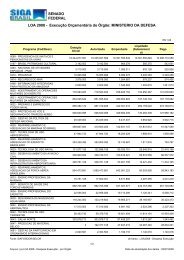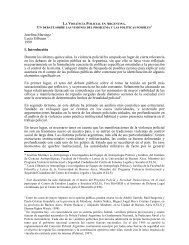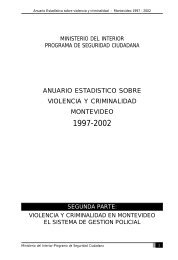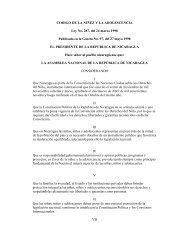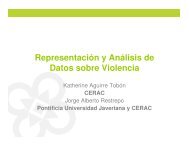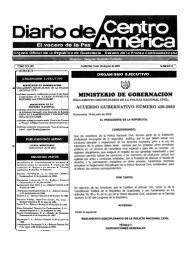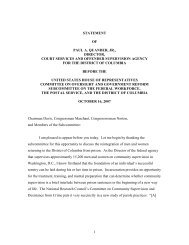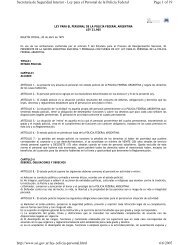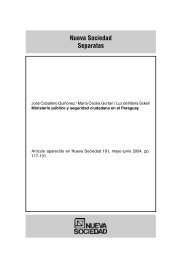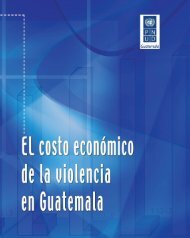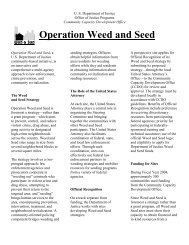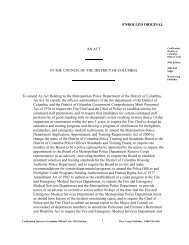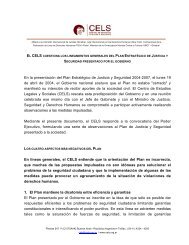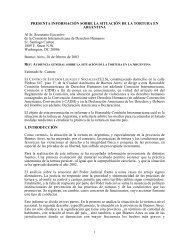Venezuela: The Life and Times of the Party System - Political ...
Venezuela: The Life and Times of the Party System - Political ...
Venezuela: The Life and Times of the Party System - Political ...
Create successful ePaper yourself
Turn your PDF publications into a flip-book with our unique Google optimized e-Paper software.
camps. 1 AD maintained an underground organization throughout <strong>the</strong> dictatorship, supporting<br />
cl<strong>and</strong>estine networks <strong>and</strong> making several frustrated attempts to assassinate <strong>the</strong> military<br />
leadership. None<strong>the</strong>less, as late as mid-1957, <strong>the</strong> combination <strong>of</strong> strong economic resources, a<br />
powerful police apparatus, <strong>and</strong> visible public backing by <strong>the</strong> United States made continued<br />
military rule seem a safe bet.<br />
But resistance mounted from that point, <strong>and</strong> <strong>the</strong> military regime unraveled quickly.<br />
Confident <strong>of</strong> his position, Perez Jimenez called elections for December 1957, but with no warning<br />
scrapped election plans in favor <strong>of</strong> a plebiscite. <strong>The</strong>re was to be only one c<strong>and</strong>idate for every<br />
<strong>of</strong>fice; all <strong>Venezuela</strong>ns over 18 <strong>and</strong> all foreigners with more than two years <strong>of</strong> residence were<br />
declared eligible voters. <strong>The</strong> affront <strong>of</strong> <strong>the</strong> plebiscite helped unify <strong>and</strong> stimulate opposition, <strong>and</strong><br />
intramilitary support proved to be surprisingly brittle. Concern about <strong>the</strong> economy, resentment<br />
over corruption, <strong>and</strong> mingled fear <strong>of</strong> <strong>and</strong> disdain for <strong>the</strong> secret police soon resulted in a failed<br />
military coup on New Year’s Day, 1958. Although <strong>the</strong> attempt was put down, <strong>the</strong> dictator’s<br />
invincible image had cracked. Underground political forces, now united in a Junta Patriótica,<br />
mounted a wave <strong>of</strong> demonstrations <strong>and</strong> street fighting. 2 <strong>The</strong> regime collapsed in a few weeks,<br />
<strong>and</strong> Perez Jimenez fled <strong>the</strong> country on January 23, 1958. A Provisional Government (under<br />
mixed military <strong>and</strong> civilian rule) took over: elections were scheduled <strong>and</strong> held at <strong>the</strong> end <strong>of</strong> <strong>the</strong><br />
year. Perez Jimenez was <strong>Venezuela</strong>’s last military ruler.<br />
<strong>The</strong> events <strong>of</strong> January 23, 1958 mark not only <strong>the</strong> restoration <strong>of</strong> democracy, but in a<br />
deeper sense, <strong>the</strong> creation <strong>of</strong> a different <strong>and</strong> more enduring kind <strong>of</strong> democratic politics. <strong>The</strong><br />
democracy begun in 1958 has indeed survived, but more has been accomplished that just<br />
hanging on to <strong>of</strong>fice. <strong>The</strong> parties <strong>the</strong>mselves <strong>and</strong> <strong>the</strong> democracy <strong>the</strong>y support <strong>and</strong> defend have<br />
also changed. Within <strong>the</strong> overall history <strong>of</strong> democracy, we suggest a fur<strong>the</strong>r periodization: <strong>the</strong><br />
trienio; <strong>the</strong> decade after 1958 (when enemies <strong>of</strong> Right <strong>and</strong> Left were isolated <strong>and</strong> defeated); <strong>the</strong><br />
subsequent fifteen years when democracy was consolidated around competition between AD <strong>and</strong><br />
COPEI; <strong>and</strong> <strong>the</strong> years since <strong>the</strong> mid-1980s, which combine sharp economic downturn <strong>and</strong><br />
growing electoral balance between AD <strong>and</strong> COPEI with bold innovations designed to make<br />
<strong>Venezuela</strong>n democracy more flexible <strong>and</strong> democratic.<br />
<strong>Political</strong> change after 1958 was driven by <strong>the</strong> lessons political actors chose to learn from<br />
recent experience. Key members <strong>of</strong> <strong>the</strong> political class saw <strong>the</strong> fall <strong>of</strong> Perez Jimenez as a second<br />
chance for democracy, an opportunity to correct past mistakes <strong>and</strong> avoid repeating <strong>the</strong> political<br />
disasters <strong>of</strong> <strong>the</strong> trienio, which were identified above all as polarization, a sense <strong>of</strong> uncontrolled<br />
conflict, <strong>and</strong> <strong>the</strong> alienation <strong>of</strong> powerful minorities. Many who had welcomed <strong>the</strong> coming <strong>of</strong> military<br />
rule (opposition parties, foreign business, <strong>the</strong> Church) ended up suffering under Perez Jimenez<br />
1 On <strong>the</strong> secret police, see Abreu (1964).<br />
2 <strong>The</strong> period is described vividly in Kolb (1974) <strong>and</strong> also Stambouli (1980).



